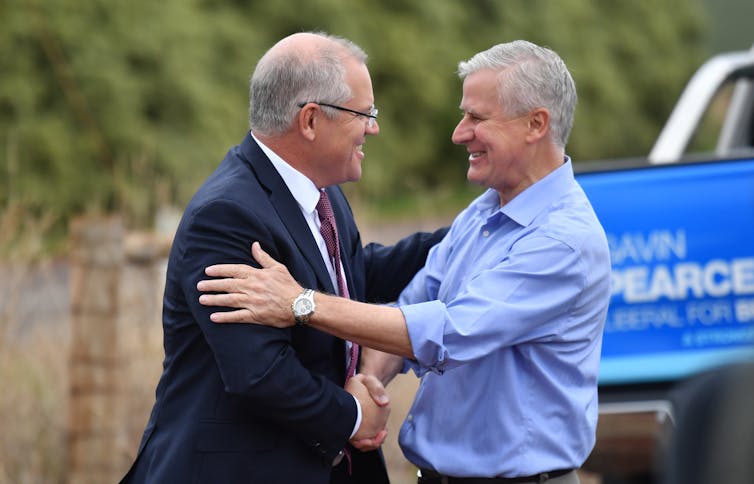
AAP/Mick Tsikas
Chris Aulich, University of Canberra
The Coalition has been buoyed by the re-election of the Berejiklian government at the recent New South Wales state election. But this in turn has been tempered by the poor performance of the National Party. The Nationals suffered swings averaging 20%, primarily to the Shooters, Fishers and Farmers Party (SFF) but also to well-known independents.
Read more:
View from The Hill: NSW result gives federal Liberals a boost in the mind games
The SFF’s Roy Butler captured an 18% swing against the Nationals to win the seat of Barwon, and in Murray, the SFF‘s Helen Dalton defeated the sitting National member, Austin Evans, with a 20% swing. In Wagga Wagga, sitting independent Joe McGirr comfortably retained the seat he won in the 2018 byelection, and in Dubbo, the Nationals held on in spite of a swing of 23% against them.
So why is the Nationals brand on the nose in regional Australia?
When the party leaders Warren Truss and Malcolm Turnbull signed their Coalition agreement in 2015, it was accompanied by a “side letter”, unusual for these agreements. It placed water management in the agriculture portfolio under the watch of then-deputy Nationals leader, Barnaby Joyce, and restrained the government from changing its climate and marriage equality policies.
This was described by many at the time as a clear win for the Nationals, but it now looks more like a poisoned chalice.
In the 2019 federal election, several Coalition-held regional seats are being challenged by independents. Many of these independents say they are standing because of the inability of governments to manage water resources. Southern farmers, irrigators and residents clearly agree with this assessment by recently conducting a tractor and truck protest in the centre of Albury.
Other independents cite declining standards of living in the bush as their motive for standing. New NSW state member, Roy Butler, argues that regional communities are losing health services, jobs and investment in infrastructure. This is reflected in the average life expectancy in regional Australia, which is increasing marginally, but at a significantly lower rate than in urban areas. Butler has also taken up concerns about water, describing the “shameful mismanagement of water in the Murray-Darling”.
Nor has the recent federal budget been a circuit breaker for regional Australia. Analysts have concluded that regional Australia (and older people) would benefit the least from the Coalition’s tax cuts to 2024-25, with middle- and high-income city dwellers faring best. Importantly for many in the regions, little attention was paid in the budget to water management.
The Nationals have also been accused by many in regional areas of favouring the big irrigators, ignoring climate change and being out of touch with the electorate. National leaders have not helped by blaming the ABC for “setting rural policy” (Barnaby Joyce) or the drought itself (Darren Chester).
These complaints of regional neglect have manifested in the nomination of a number of strong independents in the federal election. In the Northern NSW seat of Cowper, former independent MP Rob Oakeshott is challenging the Nationals’ Pat Conaghan. Needing a swing of less than 5%, this seat is now very much a marginal one.
While independent Cathy McGowan is not seeking re-election in the Victorian seat of Indi, her supporters have endorsed another independent, Helen Haines. However, Haines faces a tight contest against former Wodonga Mayor and National, Mark Byatt. She has inherited McGowan’s grassroots organisation, Voices for Indi, which has mounted a campaign drawing support from both the centre and the right. Hubs of the “orange independent movement” have been established throughout the electorate to act as policy touchstones, as well as providing feedback to the candidate.
In Farrer, Albury Mayor Kevin Mack hopes to unseat the Liberals’ Sussan Ley by adopting a similar grassroots campaign to that in Indi. The “Voices for Farrer” group is frustrated by the failure of MPs to address health, education and transport issues, and the inability of government to resolve the water crisis in irrigation areas.
Read more:
One Nation, guns and the Queensland question: what does it all mean for the 2019 federal election?
The sprawling regional seat of Mallee in Victoria has been held by the Nationals for 70 years and received a swing of 25% at the last election. However, sitting member Andrew Broad is not recontesting, leaving political life under a cloud. Local farming identity, Ray Kingston, another former local mayor, is standing as an independent. It is likely he will win votes from the Nationals, but whether or not it will be enough is debatable. Kingston echoes the refrain of other regional independents when he says “country people aren’t silly, they know we don’t get looked after”.
It has often been argued that there is a disconnection between what voters want and what their representatives are prepared to do. It manifests itself in issues such as marriage equality, climate change mitigation and population policy more generally.
In regional areas, the independents movement has focused on health and education and above all, water management. Frustration with the Nationals is clear. As Roy Butler says, “the loss of regional seats is the price [the Nationals] paid for regional neglect” in NSW.
It may also be a price that the federal Coalition has to pay.![]()
Chris Aulich, Adjunct Professor at the University of Canberra, University of Canberra
This article is republished from The Conversation under a Creative Commons license. Read the original article.









comments